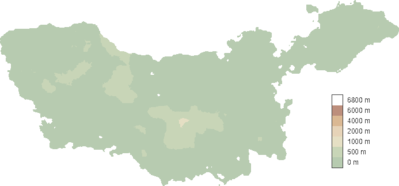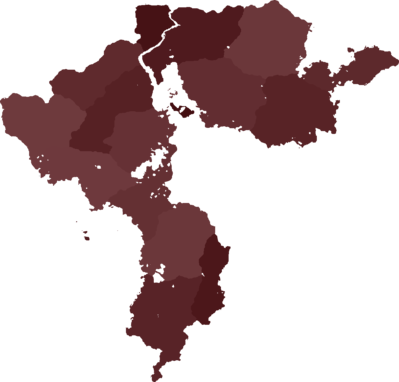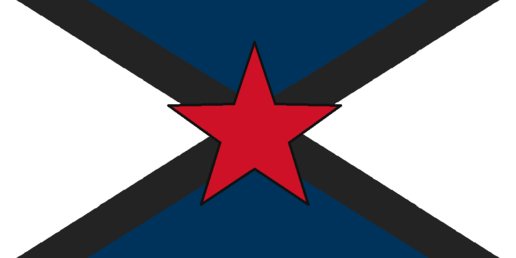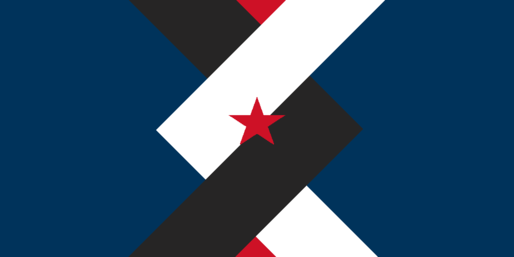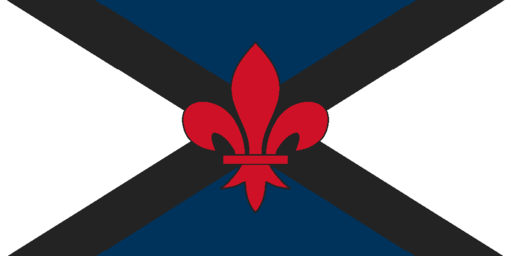Westray
Westray, formally The Dominion of Westray of the Imperial Union, is a founding member state of the Imperial Union located in the eastern regions of the Westray Peninsula. Famously known for its characteristic shrimp-tail shape, Westray is an agricultural and economic powerhouse of the Imperial Union.
|
Dominion of Westray of the Imperial Union
Westrêch
|
|||||
|---|---|---|---|---|---|
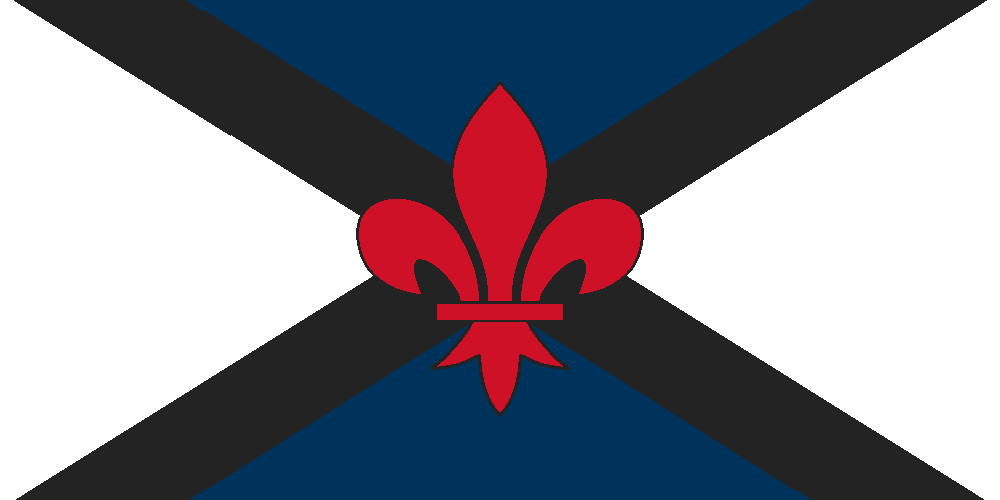 |
|||||
| Motto | "Troch Moed en :eauwen" (Through Courage and Faith) | ||||
| Common Name | Westray | ||||
| Anthem | "Kevin MacLeod - Groove Grove" | ||||
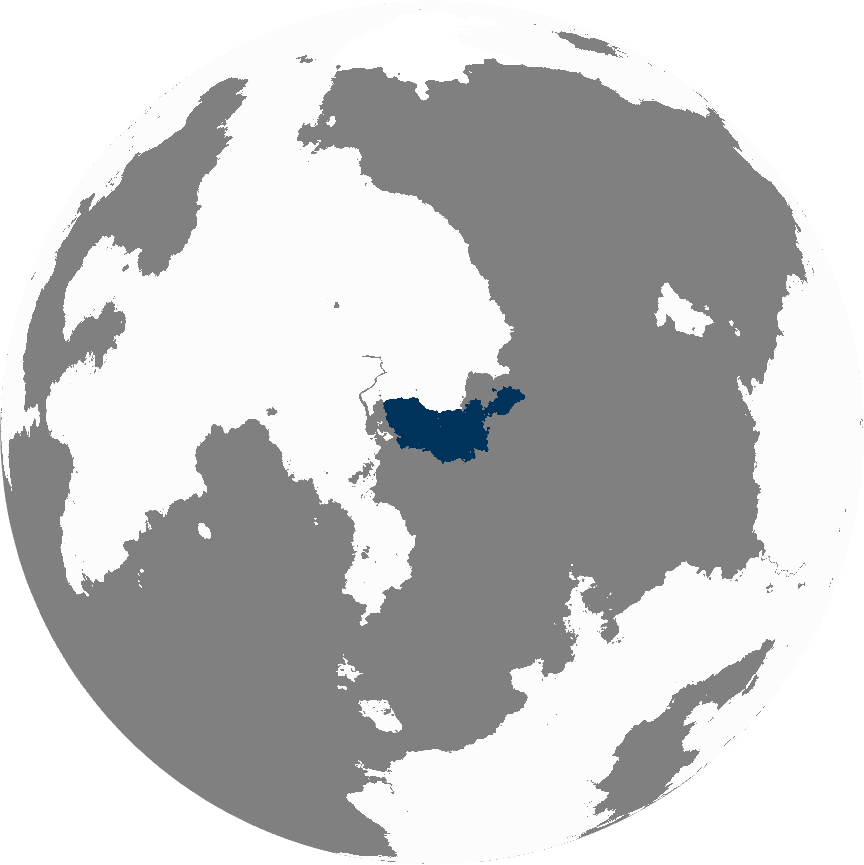 |
|||||
| Demonym | Westrayan | ||||
| Official languages | Vocav-Westrayan | ||||
| Currency | Imperial Credits | ||||
| Politics | |||||
| Capital | Wess | ||||
| Government | Parliamentary Theocratic Monarchy | ||||
| Foundation | 1987 (Declaration of Unification)
2040 (Constitutional Reorganisation) 2062 (Formation of the Second Republic) 2068 (Elysian Annexation) 2092 (Tau Liberation, Formation of the Third Republic) 2111 (Royal Restoration) 2144~ (Imperial Union) |
||||
| Demography | |||||
| Ethnicities | 93% Westrayan
2.5% Kardanian 1.5% Other Krakenary 3% Other |
||||
| Population | 16,761,364 (2200) | ||||
| Area | 39,073 km² | ||||
Etymology
The nation's name originates from the native Vocav-Westrayan word West-rêch, translating into "Ridges of the West", referring to the mountainous terrains of West Westray that characterise Northern Vocavium and Westray. The name has caused much confusion in the modern day as popular misconceptions lead to the understanding of Westray as a "western" Kafrican nation instead of its actual location in the Eastern coast.
Geography
Westray is located on the eastern section of the Westray Peninsula, bordering Vocavium to its west and Elysium to the north across the Great Haldern Mountain range. The close proximity to Vocavium and connection via the K'yangtze river and surrounding plains have resulted in an intricate intertwining of the two nation's histories throughout the eras, cuminating in the shared Vocav-Westrayan culture of present.
Domestically, Westray is much like its western neighbour in its abundance of fertile plains and mountain ranges. The northern provinces of the nation is interrupted by the Great Haldern Mountain range that runs from the coast of the Tau Sea to Vocavium's Avem Mountain range, and thus unsuitable for large scale agriculture. Historically, the northern regions have been vastly underpopulated and underdeveloped in comparison to other provinces, however the northern provinces are currently subjected to extensive Imperial infrastructure and surveying projects as recent geographic surveys have revealed rich deposits of valuable rare-metals and minerals near the previously uninhabited mountains.
South Westray is chracterised by its unique shrimp-like gulf and sea passage to Vocavium through the East River Islands, and consequently have overwhelmed their northern counterparts with their population and agricultural output. The conveinence of the river passage and close proximity to coastal Tau nations have laid the foundation for Westray's modern reputation as the de-facto trade hub for Eastern Kafrica. Fertile plains marked by pockets of large lakes is another characteristic of south Westray, something many Westrayans believe to be a blessing from the Thunderbird, a mythical proponent of the Vocav-Westrayan religion and culture.
Climate
###
Biodiversity
###
Urban Areas
###
Politics
Government
###
Subdivisions
###
Foreign Relations
###
Demographics
Languages
Due to pre-modern Westray's influential role as the dominant regional trade power, the nation has long posessed citizens with foreign ancestries, mostly descending from faraway traders who elected to stay behind with the blessed land of the west. As such, south Westray has historically been a hub of mutli-culutural and lingual dialogue, intensified by Westray's induction to the greater Imperial Union. Following the formation of the Imperial Union, demographics and langauges spoken in the region has slightly shifted towards Orinian and Baskay descendants.
Education
###
Religion
Much like its sister nation Vocavium, the dominant religions in Westray have historically been of Vogelic origins that primarily worshipped the mythical Thunderbird as the creator and guardian of the universe. Modern archaeology and historical analysis suggests that the proto-Vogelic religion originated from animistic worship from the mountain tribes of current-day Vocavium, spreading to Westray during the Great Nomadic Period. While a small minority of Westrayans and Vocavians still follow the modern equivalent of proto-Vogelism to this day, the religious landscape of the Westrayan peninsula has since shifted in favour of the Engelhafts.
Engelhaft (Angelics)
Engelhafts, also known as Angelics, are proponents of the dominant Westrayan religion of Angelism. The religion originates to the end of the Great Nomadic Period, where prominent nation states such as Haelingwerf and Roodval began forming in the southermost provinces of Westray. The Evangelium, the primary sacred scripture of Angelism that documented its birth, records the first Engelhaft to be Lambert, son of Alfred, a school teacher in current day Windsteer. Verified historical records and excerpts from the Evangelium depict Lambert to be an ordinary man until his stark transformation at the start of 295, where he began depicting anomalously altruistic behaviour with an "unfamiliar yet comforting smile" (Initium 2:4) and claiming that he was "chosen by the great Thunderbird to spread the tantamount message of salvation" (Initium 2:21).
Birth of Angelism
Reputable historical sources from the time period verify that Lambert was able to convert his small village of Milchberg over the summer of 295, becoming known to surrounding villages and proto-city states as the Earste Ingel (The First Angel). Journals recovered in archaeological expeditions near the presumed location of Milchberg depict Lambert as "a man who delivered the most energetic address in the most gentle way I have seen", attempting to convince the general population that "the Thunderbird loves us dearly and has chosen us to become Angels, the eternal servants of the sacred Thundebrird" (Recovered Journal of Lijsbeth of Milchberg, presumed 293-299). Further archaeological evidence was able to verify the claims of the Evangelium that Lambert swiftly garned devout followings numbered in the thousands by the end of 297.
In the opening months of 298, beliving his purpose imbued by his deity was to spread the message of "angelic salvation", Lambert and 20 of his most devout followers would embark on a pilgrimage from Milchberg (present-day Central Vocavium) to Haelingwerf and Roodval, the two most prominent prot-city states located near the present-day Westrayan-Vocav border. Lambert's journey is presumed to have followed around the coast of eastern Vocavium and western Westray due to the populous settlements of the time period being concetrated on the coast. Chapters of Evangelium are dedicated to the recounting of the journey, detailing how Lambert was able to connect with and convert swathes of villagers he encountered around the coastal area. In one episode, Lambert is said to have summoned a bolt of lightning behind him as a show of power to interrupt an impending brawl in the town of Mereford, immediately stunning those involved in the brawl. The book of Reis in the Evangelium tells of how Lambert was then able to convince the hooligans invovled in the brawl that "they were all brothers and sisters destined to become Angels of the Thunderbird" (Reis 12:9), leading to the hooligans "kneeling on the spot and praising the name of Lambert and the merciful and loving Thunderbird".
Death of Lambert and Spread of Angelism
Upon arriving in the harbour city of Haelingwerf, Lambert was "welcomed by a wave of residents who had heard of Lambert's messages ahead of him", which was "an unexpected yet warmingly welcome suprise" for Lambert and his group. The merchant guild leaders of Haelingwerf also provided support to the exhausted group, as seaborne merchantmen tended to be the most devout followers of the original proto-Vogelic religions. Despite the insistence of his followers and the merchants, Lambert would sleep with the peasants on the stone-paved harbour during his stay in Haelingwerf, reasoning that "the poor and the unwelcomed are too sacred angels of the Thunderbird. How could I ignore the very brothers and sisters who need me the most?" (Reis 28:5). The area of the harbour slept on has been preserved ever since his death to this day as a religious monument for devout followers.
Contrary to the warm welcome Lambert received in Haelingwerf, it was open hostility that he encountered in Roodval. Unlike the loosely-governed merchant port of Haelingwerf, Roodval was a proto-monarchy led by the self-proclaimed King Godwine, who detested the openly egalitarian messages Lambert had been popularising throughout the peninsula. Paranoid that Lambert's presence would embolden the farmer peasants for a potential revolt against his rule, Godwine ordered the arrest of Lambert and his followers on the second day of their pilgrimage in Roodval. According to the book of Versuch, Lambert and his followers were assisting a group of farmers in their harvest when Godwine's guards arrived for Lambert's detainment. A brawl ensued as the farmers and Lambert's followers attempted to resist; as a result 3 of Lamberts followers were critically wounded and 1 killed.
Afraid that the population would rejoice further if Lambert were to be released, Godwine would declare Lambert's execution upon the charges of sedition. The declaration caused severe outrage from the peasant population and smaller nearby outposts, which only reinforced Godwine's paranoia that Lambert's sole aim was to deconstruct his absolute power in Roodval. When asked for any requests prior to his execution, Lambert would request he be pushed off the Gelb Cliff (Versuch 4:4), the prominent coastal cliff on the edges of Roodval. While Godwine expressed skepticism upon the unusual nature of Lambert's request, he was reluctantly forced to accept his request to avoid further public peasant outrage.
On the morning of September 5th 299, Lambert would be forced up the highest point of Gelb Cliff with ropes of kelp wound around his feet and wrists to impede his movement in case of escape. Historical records depict a large following of 100-250 peasants and religious followers accompanying Lambert on his climb, many of them visitors from other villages. Before his death, Lambert would request his kelp restraints be unbound, which was obliged by the guards. After a short farewell speech to his followers and peasants who had accompanied him, Lambert would throw himselff off the cliff face around noon. Upon the ledge he stood were a clump of large white feathers, which led to loud rejoicing and cheers from the spectating crowd (Versuch 10:19). Lambert's body was never recovered, which was taken by his followers as a sign of Angelic ascension.
Lambert's execution at the hands of the tyrant king shcoked many observers throughout the Westray peninsula, and his followers valiant effort to document Lambert's sermons and journey resulted in his followership to grow exponentially. In the year 315, the first version of The Evangelium would be written by a cohort of Lambert's closest followers, and in the year 317 the Church of Engels would be founded in Lambert's hometown Milchberg. By the year 400, 54 out of 68 recognised city-states in the Westray Peninsula officially followed Angelism as its main state religion, which inreased to 60 out of 71 in the year 420.
Core beliefs
###
Engelic Renaissance
Despite Westray's devout religious history, Angelic monuments and culture was virtually wiped out under successive occupations and oppressions in 21st and 22nd centuries. However, with the waves of Westrayan nationalism under the 2111 Royal Restoration led to the modern rediscovery and appreciation of Angelism, heavily encouraged by the new Monarchist government to increase their status as the legitimate Westrayan government. During the consolidation phase of the Imperial Union, Angelism was also recognised by state officials to be an effective method of increasing unity and productivity of citizens empire-wide, leading to the adoption of Angelism as the main state religion of the Imperial Union.
Military
Air Corp
###
Army
###
###
Economy
Taxation
###
Transport
###
Energy and Infrastructure
###
Trade
###
Science
###
